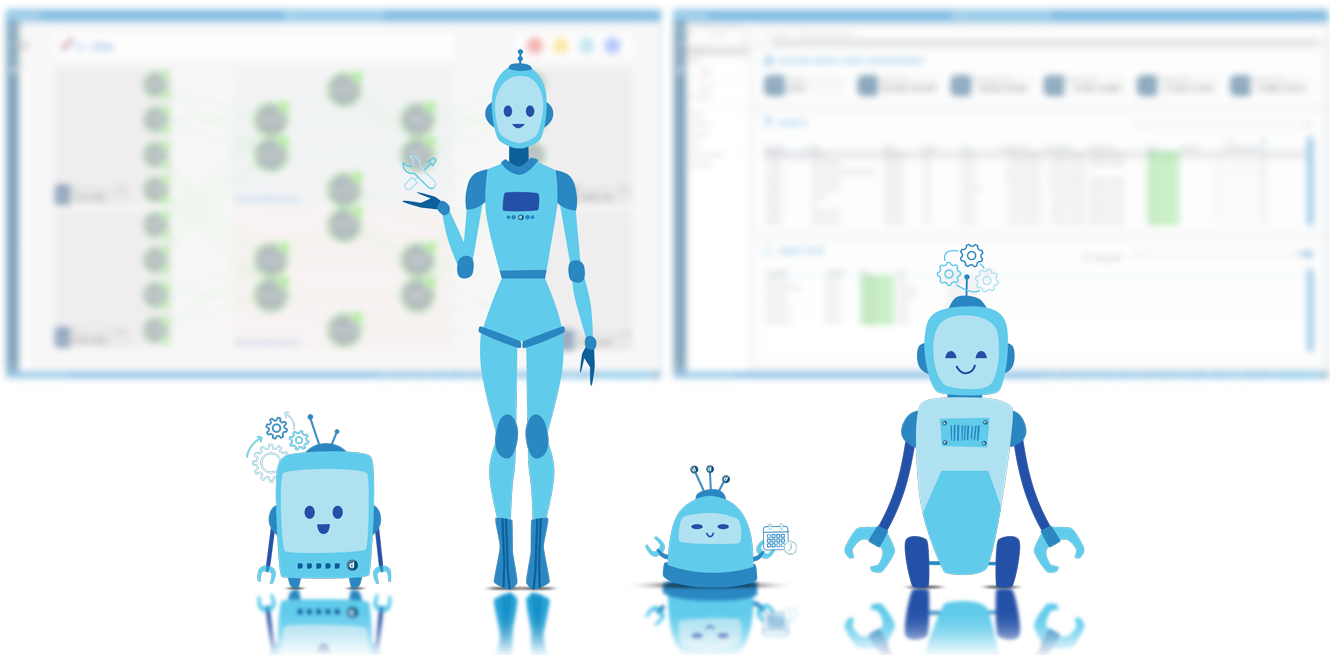DataMiner SRM
Service and Resource Manager
DataMiner Service and Resource Management (SRM) empowers ICT media & broadband teams with a versatile toolset tailored to their orchestration and automation needs.
More info about DataMiner SRM


Decrease opex thanks to
far-reaching automation
Eliminate the most time-consuming, repetitive manual actions from your operation

Increase service uptime
and SLA levels
Reduce the risk of errors with integrated configuration validation

Deliver value instantly
and continuously
Get started with SRM without any coding and grow towards full service orchestration
A family of different use cases
working in harmony for you
When it comes to automation and orchestration, there’s no one-size-fits-all solution. But with DataMiner, DevOps engineers can cherry-pick the right tool for the right job, creating value in the fastest possible manner! Say hello to DataMiner’s SRM family: four different use cases that can flexibly be combined within or across workflows:
Resource Scheduling
Keeps track of all resource schedules without automating actions, for maximum flexibility.
Resource Automation
Configures complex resources with the click of a button.
Resource Orchestration
Combines the power of resource schedules with automatic configuration actions at booking start and end.
Service Orchestration
Orchestrates the entire service life cycle; ideal for your most repetitive workflows.
Each workflow within your operation has its optimal level of automation. But to achieve this optimal level, you need a good balance between the amount of repetitive manual activity needed in the workflow and the development effort for creating and testing automation.
The renewed DataMiner SRM stack empowers teams to cherry-pick the right tools for the right job at the right moment, so that they can effortlessly reach that optimal level of automation.
Empower teams with a modular toolset tailored to their automation & orchestration needs
Any initiative in your organization that requires automation and orchestration is a journey. It is impossible to delay your on-air dates because the automation is not yet in its “ideal” end state. Agility for DevOps teams is therefore table stakes.
The four different DataMiner SRM use cases are the toolbox empowering DevOps teams on that journey. DevOps teams can mix and match use cases at will within a single operation—and even a single service! What’s more, they can immediately start using DataMiner SRM without writing a single line of code.
For a detailed description of the features and capabilities of each of these modules check out DataMiner Dojo.
Key features
wide range of possibilities for booking schedules
schedule-aware monitoring
keeps track of used capacity over time of all your resources
open automation engine to fully customize all behavior
support for resources of any kind: physical, virtual, cloud-based, human…
vendor-independent profiles
expose elementary functional capabilities of complex products as individual virtual functions
calculate intelligent network paths for your services across your network resources
powerful automated orchestration of all service lifecycle transitions
interfaces with any external scheduling system
SLA Management (optional)
Your benefits
decreased OPEX as a result of far-reaching automation
increases service uptime and SLA levels
unify all your resource and service schedules into one
streamline your most complex event schedules
eliminate resources conflicts: your planned services are guaranteed to run, even if planned way ahead of time
benefit from technology abstraction during service design
launch new services with a couple of clicks
optimize your resource utilization on-premises and in the cloud
increase speed and reliability of your operations
focus on incidents that matter based on service impact
grow the platform yourself using DevOps practices
Extend your capabilities
Level up your business even further and explore all your options with these additional DataMiner solutions.